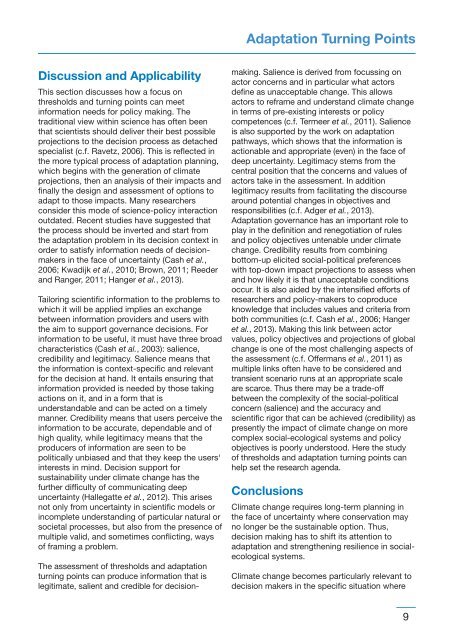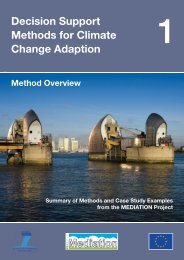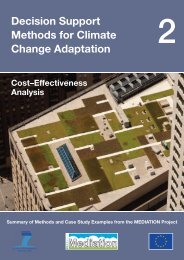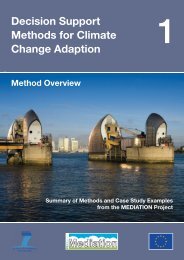Adaptation Turning Points - Mediation
Adaptation Turning Points - Mediation
Adaptation Turning Points - Mediation
Create successful ePaper yourself
Turn your PDF publications into a flip-book with our unique Google optimized e-Paper software.
<strong>Adaptation</strong> <strong>Turning</strong> <strong>Points</strong>Discussion and ApplicabilityThis section discusses how a focus onthresholds and turning points can meetinformation needs for policy making. Thetraditional view within science has often beenthat scientists should deliver their best possibleprojections to the decision process as detachedspecialist (c.f. Ravetz, 2006). This is reflected inthe more typical process of adaptation planning,which begins with the generation of climateprojections, then an analysis of their impacts andfinally the design and assessment of options toadapt to those impacts. Many researchersconsider this mode of science-policy interactionoutdated. Recent studies have suggested thatthe process should be inverted and start fromthe adaptation problem in its decision context inorder to satisfy information needs of decisionmakersin the face of uncertainty (Cash et al.,2006; Kwadijk et al., 2010; Brown, 2011; Reederand Ranger, 2011; Hanger et al., 2013).Tailoring scientific information to the problems towhich it will be applied implies an exchangebetween information providers and users withthe aim to support governance decisions. Forinformation to be useful, it must have three broadcharacteristics (Cash et al., 2003): salience,credibility and legitimacy. Salience means thatthe information is context-specific and relevantfor the decision at hand. It entails ensuring thatinformation provided is needed by those takingactions on it, and in a form that isunderstandable and can be acted on a timelymanner. Credibility means that users perceive theinformation to be accurate, dependable and ofhigh quality, while legitimacy means that theproducers of information are seen to bepolitically unbiased and that they keep the users‘interests in mind. Decision support forsustainability under climate change has thefurther difficulty of communicating deepuncertainty (Hallegatte et al., 2012). This arisesnot only from uncertainty in scientific models orincomplete understanding of particular natural orsocietal processes, but also from the presence ofmultiple valid, and sometimes conflicting, waysof framing a problem.The assessment of thresholds and adaptationturning points can produce information that islegitimate, salient and credible for decisionmaking.Salience is derived from focussing onactor concerns and in particular what actorsdefine as unacceptable change. This allowsactors to reframe and understand climate changein terms of pre-existing interests or policycompetences (c.f. Termeer et al., 2011). Salienceis also supported by the work on adaptationpathways, which shows that the information isactionable and appropriate (even) in the face ofdeep uncertainty. Legitimacy stems from thecentral position that the concerns and values ofactors take in the assessment. In additionlegitimacy results from facilitating the discoursearound potential changes in objectives andresponsibilities (c.f. Adger et al., 2013).<strong>Adaptation</strong> governance has an important role toplay in the definition and renegotiation of rulesand policy objectives untenable under climatechange. Credibility results from combiningbottom-up elicited social-political preferenceswith top-down impact projections to assess whenand how likely it is that unacceptable conditionsoccur. It is also aided by the intensified efforts ofresearchers and policy-makers to coproduceknowledge that includes values and criteria fromboth communities (c.f. Cash et al., 2006; Hangeret al., 2013). Making this link between actorvalues, policy objectives and projections of globalchange is one of the most challenging aspects ofthe assessment (c.f. Offermans et al., 2011) asmultiple links often have to be considered andtransient scenario runs at an appropriate scaleare scarce. Thus there may be a trade-offbetween the complexity of the social-politicalconcern (salience) and the accuracy andscientific rigor that can be achieved (credibility) aspresently the impact of climate change on morecomplex social-ecological systems and policyobjectives is poorly understood. Here the studyof thresholds and adaptation turning points canhelp set the research agenda.ConclusionsClimate change requires long-term planning inthe face of uncertainty where conservation mayno longer be the sustainable option. Thus,decision making has to shift its attention toadaptation and strengthening resilience in socialecologicalsystems.Climate change becomes particularly relevant todecision makers in the specific situation where9





